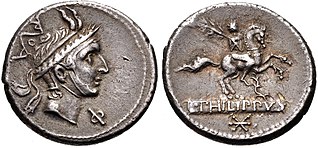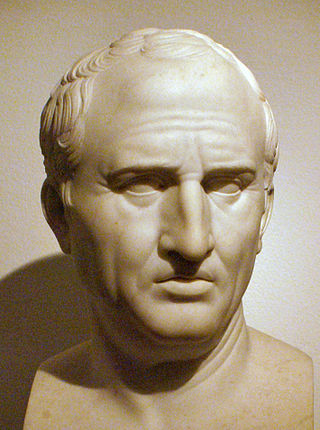Related Research Articles

Ptolemy XII Neos Dionysus was a king of the Ptolemaic Kingdom of Egypt who ruled from 80 to 58 BC and then again from 55 BC until his death in 51 BC. He was commonly known as Auletes, referring to his love of playing the flute in Dionysian festivals. A member of the Ptolemaic dynasty, he was a descendant of its founder Ptolemy I, a Macedonian Greek general and companion of Alexander the Great.
Quintus Hortensius Hortalus was a famous Roman lawyer, a renowned orator and a statesman. Politically he belonged to the Optimates. He was consul in 69 BC alongside Quintus Caecilius Metellus Creticus. His nickname was Dionysia, after a famous actress. After his retirement Hortensius took up fish-breeding as a hobby. Cicero spoke of him as a Piscinarius – 'fish fancier'.

The gens Rabiria was a minor plebeian family at Ancient Rome. Although of senatorial rank, few members of this gens appear in history, and the only one known to have held any of the higher offices of the Roman state was Gaius Rabirius Postumus, who was praetor circa 48 or 47 BC.
Aulus Gabinius was a politician and general of the Roman Republic. He had an important career, culminating with a consulship in 58 BC, mainly thanks to the patronage of Pompey. His name is mostly associated with the lex Gabinia, a law he passed as tribune of the plebs in 67 BC that granted Pompey an extraordinary command in the Mediterranean Sea to fight the pirates.

Pro Caelio is a speech given on 4 April 56 BC, by the famed Roman orator Marcus Tullius Cicero in defence of Marcus Caelius Rufus, who had once been Cicero's student but more recently was a political rival. Cicero's reasons for defending Caelius are uncertain, but various theories have been postulated.
Gaius Rabirius was a Roman senator who was involved in the death of Lucius Appuleius Saturninus in 100 BC. Titus Labienus, a Tribune of the Plebs whose uncle had lost his life among the followers of Saturninus on that occasion, was urged by fellow Senator and patron Julius Caesar to accuse Rabirius of participating in the murder. Caesar's real objective was to warn the Senate against interference by force with popular movements, to uphold the sovereignty of the people and the inviolability of the person of the tribunes, at the time of the conspiracy of Lucius Sergius Catilina. The obsolete accusation of perduellio was revived, and the case was heard before Caesar and his cousin Lucius Julius Caesar as commissioners specially appointed.
Gaius Amafinius was one of the earliest Roman writers in favour of the Epicurean philosophy. He probably lived in the late 2nd and early 1st century BC. He wrote several works, which are censured by Cicero as deficient in arrangement and style. He is mentioned by no other ancient writer but Cicero. In the Academica, Cicero reveals that Amafinius translated the Greek concept of atoms as "corpuscles" (corpusculi) in Latin.

Lucius Marcius Philippus was a Roman orator and an important politician of the late Roman Republic.

Imperium is a 2006 novel by English author Robert Harris. It is a fictional biography of Cicero, told through the first-person narrator of his secretary Tiro, beginning with the prosecution of Gaius Verres.
Lucius Caninius Gallus was a Roman politician of the Roman Republic. Gallus was of plebeian status and came from a family of consular rank. Gallus was a contemporary and friend to dictator Gaius Julius Caesar, also to politicians Marcus Terentius Varro and Marcus Tullius Cicero. Gallus was a man of political talent and acquirements.

The writings of Marcus Tullius Cicero constitute one of the most renowned collections of historical and philosophical work in all of classical antiquity. Cicero was a Roman politician, lawyer, orator, political theorist, philosopher, and constitutionalist who lived during the years of 106–43 BC. He held the positions of Roman senator and Roman consul (chief-magistrate) and played a critical role in the transformation of the Roman Republic into the Roman Empire. He was extant during the rule of prominent Roman politicians, such as those of Julius Caesar, Pompey, and Marc Antony. Cicero is widely considered one of Rome's greatest orators and prose stylists.
Lucius Valerius Flaccus was a consul of the Roman Republic in 100 BC and princeps senatus during the civil wars of the 80s. He is noted for his peace initiatives, which failed, and for sponsoring the Lex Valeria that created the dictatorship of Sulla.
Gaius Appuleius Decianus was tribune of the plebs in 98 BC, known primarily for his connection to politically motivated prosecutions in the Late Roman Republic.

The gens Memmia was a plebeian family at ancient Rome. The first member of the gens to achieve prominence was Gaius Memmius Gallus, praetor in 172 BC. From the period of the Jugurthine War to the age of Augustus they contributed numerous tribunes to the Republic.
Pro Quinctio was a defence speech delivered by Marcus Tullius Cicero in 81 BC, on behalf of Publius Quinctius. It is noteworthy as the earliest of Cicero's published speeches to survive.
The gens Curia was a plebeian family at ancient Rome. Members of this gens are first mentioned at the beginning of the third century BC, when the family was rendered illustrious by Manius Curius Dentatus.
The gens Equitia was an obscure plebeian family at ancient Rome, known from only a few individuals. No member of this gens obtained the consulship prior to the third century, but the emperor Probus may have been descended from the Tarquitii.

The gens Labiena was a plebeian family at Rome. Members of this gens are first mentioned during the final century of the Republic.
The gens Luscia was a minor plebeian family at ancient Rome. Members of this gens are first mentioned in the early part of the second century BC. They were of senatorial rank, but few of them achieved the higher offices of the Roman state. The only known consul of this gens was Lucius Luscius Ocrea, during the Flavian dynasty.

The gens Saufeia was a minor plebeian family at ancient Rome. Members of this gens are first mentioned in the final century of the Republic, and from then to the early Empire their name occurs regularly in history, but none of them ever attained the consulship.
References
- Marcus Tullius Cicero Cicero's Speech Pro Rabirio Postumo. Oxford University Press, 2001